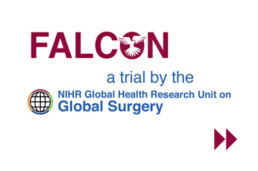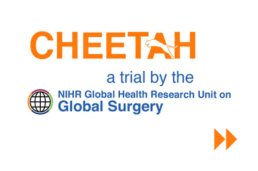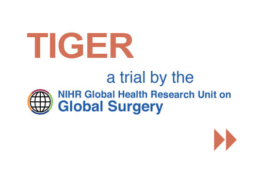Rural Networks
Improving surgical outcomes through collaborative research
The NIHR Global Health Research Unit on Global Surgery
Improving surgical outcomes through collaborative research
Rural Networks
Our work in FALCON, CHEETAH and TIGER has enabled the GSU to create pathways to rural communities. These communities are often under-represented within surgical based research, despite the fact that so many patients within LMICs may reside within rural settings. We have also embedded rural communities into our community engagement and involvement plan. This will provide an invaluable extension to the CEI program by ensuring the priorities of rural communities are recognised. More information on this area of our research can be obtained via the links below.
Rural Networks Research

FALCON TRIAL
The FALCON trial looks into the prevention of surgical site infections (SSI) in low- and middle- income countries.
The health economics sub-study within FALCON is named KIWI (Key Resource Use In Wound Infection).
Surgical site infection (SSI) is a worldwide problem which has morbidity, mortality and financial consequences .Previous studies in LMICs on the costs of SSI have been limited by small sample size single-centre hospitals which did not capture costs occurring after hospital discharge. The lack of follow up is a problem as SSI can occur after discharge and costs associated with SSI have been shown to persist beyond 30 days. The main FALCON trial is assessing different treatment combinations to reduce Surgical Site Infection (SSI). The FALCON KIWI sub study is assessing the resource use and costs for patients with and without SSI across several hub countries.

CHEETAH TRIAL
The main CHEETAH trial is assessing whether the practice of using separate, sterile gloves and instruments to close wounds at the end of surgery can reduce surgical site infection at 30-days post-surgery for patients undergoing clean-contaminated, contaminated or dirty abdominal surgery, compared to current routine hospital practice.
Using information from FALCON KIWI and primary data collection in CHEETAH, the cost-effectiveness of the changing gloves/instruments prior to wound closure compared to current routine hospital practice will be assessed.

TIGER STUDY
TIGER (Task shifting Inguinal hernia Repair between surgeons and technicians): development of a randomised trial in low and middle income countries
Can technicians perform mesh inguinal hernia repair safely and cost-effectively in rural surgical settings in low and middle income countries?
This pilot trial aims to investigate delivery of a standardised, measurable training programme for technicians to perform a mesh inguinal hernia repair.
Rural Surgery Network
Rural surgery has defied definition. National understanding of the concept seems clear enough but when exported across international boundaries, this understanding becomes murky and muddy. Instead of getting bogged down with origin and definition, we divert focus onto the objective which is unanimously understood- delivery of surgery to remote areas. This will include the underserved urban population. Under the umbrella of the Global Surgery Collaborative we invite participation of all those who are interested in the delivery of healthcare to remote and underserved areas. We will call this collaborative, a Rural Surgery Network, inclusion into which will only require motivation to impact underserved areas.
Collaborating Sites
All sites across the globe that took part in the FALCON and CHEETAH trials.

WHO CAN JOIN?
We welcome surgeons, residents, students, researchers, allied health professionals, nurses, community workers, social workers.
WHAT WILL WE DO?
We plan to direct and recruit research from and towards rural areas. In so doing we hope to permit access of rural health providers into academic studies, and recruit the participation of patients from rural areas. Through high quality research addressing needs and concerns of the majority of populations worldwide, we hope to address health needs, build capacity and eventually influence health policy.
You can subscribe to this network here via REDCap.
Bringing together surgeons, researchers and policy makers to set the local research agenda according to patient need in LMIC and ensuring all patients have the opportunity to take part in our research.
